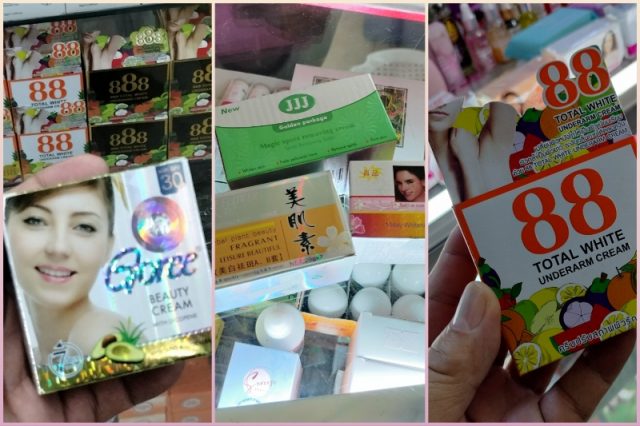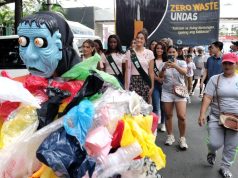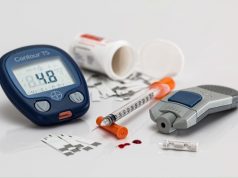
Toxic chemical watchdog EcoWaste Coalition found Rizal Province at risk for mercury exposure after detecting 28 stores dealing with products initially banned by the Food and Drug Administration (FDA).
The coalition’s recent market monitoring conducted from August 24 to 28 discovered that some stores are still selling mercury-containing whitening creams that exceed the FDA’s prescribed maximum limit of one part per million (ppm).
Using a portable X-ray fluorescence analyzer, the group executed a mercury screening test on illegal products and found alarmingly high mercury content.
Antipolo City, Rizal’s capital, had nine stores selling the Goree Beauty Cream from Pakistan, including one just a few steps away from the city hall. It contained 27,220 ppm, leading three of its variants to be banned by the FDA in 2017 and 2023.
The two other variants were sold at a local Cainta mall and Taytay pharmacy. Goree Gold 24K Beauty Cream contained 25,470 ppm, while Goree Day & Night Beauty Cream had 25,310 ppm.
Some stores in Antipolo and Montalban were also peddling 88 Total White Underarm Creams from Thailand containing 2,623 ppm mercury. The FDA issued a warning against this product in 2021.
Additionally, a beauty store in Angono was found selling JJJ Magic Spots Removing Cream, which had been seized in 2010. The cream contained mercury levels of 1,302 ppm for the day formula and 994 ppm for the night formula.
Other products, such as the 2015 FDA-banned S’Zitang 10-Day Whitening & Spot Day Night Set, containing 329 ppm (day) and 427 ppm (night), and Women of Flower Whitening and Speckle Removing A & B Series with 2,471 ppm (day) and 1,580 ppm (night).
In 2017, the ASEAN Cosmetic Directive said that a product must only contain a mercury maximum limit of one ppm. While, the Minamata Convention on Mercury agreed on a total 15 ppm concentration of mercury as the threshold for wastes contaminated with mercury compounds to ensure the safety of all consumers.
These products were also flagged for not having the required certificates of product notification.
According to Republic Act 9711 or the FDA Act of 2009, health products without the proper authorization from the administration are prohibited. Thus, the importation, selling, and distribution of flagged products are forbidden.
Safety warning
Given these findings, the coalition stressed the urgent need for immediate and comprehensive actions to safeguard public health and prevent further exposure to harmful mercury levels in beauty products.
“Our latest findings reinforce our proposal for a solution-focused summit to address this long, drawn-out problem with mercury cosmetics, which can put users and their households at risk of toxic exposure,” Aileen Lucero, EcoWaste Coalition’s national coordinator, said.
Last August 15, the group proposed a summit to the FDA where stakeholders should agree to halt the persistent trade of mercury cosmetics and “develop solutions and actions on various fronts to disable and bring an end to the unlawful trade of mercury cosmetics.”
EcoWaste Coalition will also appeal to concerned provincial, city, and municipal governments to take immediate action, in coordination with FDA Region IV-A, to protect their constituents and the environment from mercury contamination.
To date, the coalition has monitored a total of 322 errant stores across the country selling contraband products from Jan. 2023 to Aug. 2024. The National Capital Region was found to have had the highest number of stores (198). Followed by the Central Visayas Region (57) and Calabarzon Region (49).
Other sellers were also found in the Cordillera Administrative Region (10), Northern Mindanao Region (5), and Mimaropa Region (3).
Two years ago, the coalition conducted a similar assessment in August and June, discovering eight beauty products with alarmingly high mercury levels.
READ: Parley, Goree, other skin whiteners found to have high mercury content
Meanwhile, the FDA previously warned the public to be vigilant against products that are not approved and tested.
“Always check if a cosmetic product has been notified with the FDA before purchasing it by making use of the embedded Search feature of our website accessible at www.fda.gov.ph,” the state regulator said.
The FDA also advised local government units, law enforcement agencies, and concerned establishments to stand against the illegal trading of such products to ensure that these products are not made available in certain areas.
Mercury is among the 10 chemicals of major public health concern, the World Health Organization revealed.
Mercury use in skin lightening products can lead to adverse health effects, including skin rashes, discoloration and scarring and reduced dermal resistance to bacterial and fungal skin infections.
It has also warned that repeated applications of such products onto the skin can cause damage to the kidneys, the brain, and the central nervous system.









